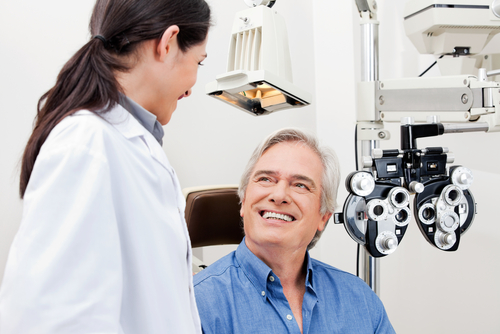Five Things To Ask at Your Next Eye Exam
September 14th, 2023
As a patient, you have the right to ask questions of your eye doctor to be proactive about your own eye health. However, in the moment, finding the right things to say and ask can be overwhelming.
Keep reading to learn five things to ask at your next eye exam!
1. What is My Current Vision Prescription?
Know your current vision prescription, and make sure you leave your eye doctor’s office with a copy. Having a current vision prescription is essential if you want to purchase glasses or contact lenses.
It is against the law for a provider to fulfill an order for contacts or vision-correcting glasses without a current prescription. Prescriptions typically expire one year after your exam date.
2. Are There Any Signs of Eye Health Issues or Concerns?
While some eye conditions are common and frustrating, like refractive errors, they do not impact your eye health. Other eye conditions, however, are best treated in the early stages to prevent vision loss and permanent, irreversible damage.
When you reach forty years of age, you may see the beginnings of presbyopia, which is blurriness of up-close vision. Reading glasses may be necessary as you grow older.
Other age-related conditions include cataracts, glaucoma, and age-related macular degeneration, all of which can cause vision problems if left untreated.
- Cataracts develop when the natural lens of the eye grows cloudy. Faded or foggy vision, a yellow cast to your eyesight, and greater difficulty driving at night are all symptoms.
- Glaucoma, often called “the silent thief of sight,” usually doesn’t cause noticeable vision changes until it’s too late. Your eye doctor can check for the signs and symptoms, which often are tied to increased pressure inside the eyes.
- Macular degeneration causes vision loss in the central portion of your viewing and is also tied to the aging eye. It’s important to catch this condition early.
3. Do I Need Any Adjustments to My Current Glasses/Contact Lens Prescription?
Some patients will need a new prescription every year. For others, changes in vision are so slight that they can go two to three years without a new prescription.
Your eye doctor will tell you whether or not your eyes have changed enough to need a new prescription.
4. How Can I Protect My Eyes and Maintain Good Eye Health?
During your routine eye exam, your eye doctor can give you some helpful tips for keeping your eyes healthy. For example, everyone should wear sunglasses.
That’s an important first step in protecting your vision. Choose sunglasses with a tag or sticker that says 100 percent UV protection or is labeled “UV absorption up to 400nm.”
Both will block harmful UV rays from damaging your eyes. Wearing protective eyewear while playing sports, mowing the lawn, doing woodworking, or doing home improvement projects is another way to lessen injuries to the eyes.
Eye health is directly related to whole-body health. If you have a chronic health problem such as diabetes, or vision problems in your family, an annual eye exam is the best way to stay on top of good eye health.
5. Are There Any Lifestyle Changes I Should Consider For Better Eye Health?
Your diet can impact your eye health. Your eye doctor can give you some advice on what foods to eat to keep your eyes healthy.
Carrots contain Vitamin A, which supports healthy eyesight. A diet rich in fruits, vegetables, beans, fish, and whole grains is good for overall health and eye-healthy eating.
While some people take vitamin supplements, it’s better if you choose dietary sources of vitamins A, C, and E, omega-3 fatty acids, antioxidants lutein and zeaxanthin, and the mineral zinc.
Certain health conditions like diabetes, high blood pressure, and heart disease can also impact your eye health, so it’s important to monitor these conditions and work with your primary care doctor to control them.
Is it time for you to have an eye exam? Schedule an appointment at Laser Eye Center in Huntsville, AL, today!



